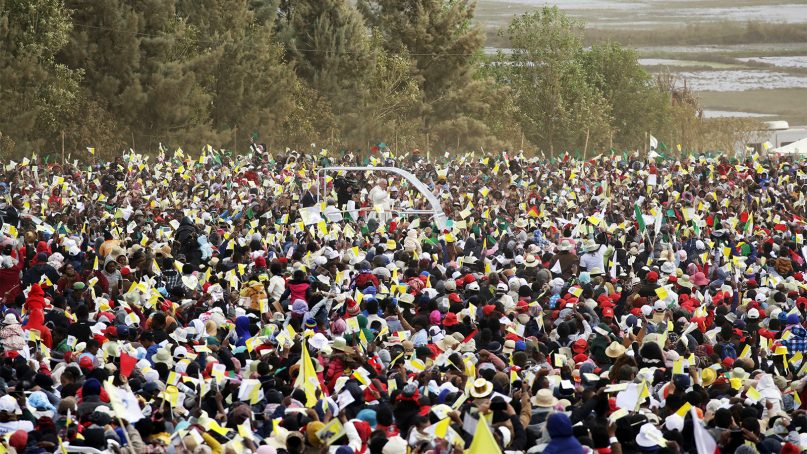VATICAN CITY (RNS) — Over the weekend in Madagascar, Pope Francis greeted packed stadiums full of celebrating locals, spoke to crowds numbering up to 1 million people and was embraced by many of the country’s youth, who traveled and waited for hours to catch a glimpse of him during his trip to the country.
But while the pope’s visit to Mozambique, Madagascar and Mauritius was buoyed by an optimistic message of peace and faith, the realities he addressed at nearly every stop weighted his speeches and meetings with concerns about climate change, poverty and other darker issues.
In the capital of Madagascar, Antananarivo, on Sept. 7, Francis called on local authorities to take more responsible care of the planet’s resources for the good “not only of present generations, but also of those yet to come,” he said.
Deforestation in Madagascar has become an increasing concern as a growing portion of its biodiverse forests are cut down and burned to leave way for cattle and farmland. According to photographic evidence, more than half of the forest in Madagascar has been lost since 1950.
The care of the environment, especially forests, is particularly important for this pontificate. Following the release of his encyclical on the environment in 2015, Laudato Si, he called a synod specifically to discuss the spiritual and environmental needs of the Amazon forest, for which the world’s bishops will come to Rome in October.
Beyond the quickening depletion of the country’s resources, the citizens of Madagascar also face crippling poverty levels that leave 75% of the population living on less than $2 a day, according to the World Bank.
During a vigil at the Soa Mandrakizay field on Saturday, Francis encouraged the thousands of young people to not stop moving forward despite the challenges of day-to-day survival and despite social injustice and instability.
Some may be “tempted to give up,” the pope said, adding that the devil often reminds us of our sins and imperfections to make us feel like “however much we do, nothing can ever change, everything will remain the same.”
But God, Francis said, “wants you to share all your gifts and charisms, all your dreams and your talents.”
The pope was met with massive enthusiasm at every stop during the second leg of his trip to Africa, and the young people who gathered for the vigil made every effort to embrace and touch the pope when he threw himself into their midst.
On Sunday (Sept. 8) Francis told about 1 million people who gathered for Mass, “In the face of contempt for human dignity, we often remain with arms folded or stretched out as a sign of our frustration before the grim power of evil.
“Yet we Christians cannot stand with arms folded in indifference, or with arms outstretched in helplessness. No. As believers, we must stretch out our hands, as Jesus does with us.”
That afternoon, Francis had a chance to see for himself what happens when people don’t give up and instead roll up their sleeves on his visit to the city of Akamasoa, which means “good friends” in Malagasy and was once the site of a landfill. Today it is home to 25,000 people.
The settlement was founded in 1989 by the Argentinian priest Pedro Opeka, who, having witnessed the extreme poverty of the people living near the garbage dump, worked for decades to create some 4,000 homes, as well as schools and health facilities.
“Every corner of these neighborhoods, every school or dispensary, is a song of hope that refutes and silences any suggestion that some things are ‘inevitable,'” the pope said to the thousands gathered in the Manantenasoa auditorium Sept. 8.
“Let us say it forcefully: Poverty is not inevitable!”
“Let us pray that throughout Madagascar and everywhere in the world this ray of light will spread, so that we can enact models of development that support the fight against poverty and social exclusion, on the basis of trust, education, hard work and commitment,” Francis said.
Francis made a stop at a nearby rock quarry where many inhabitants of Akamasoa work, often grossly underpaid. He prayed that “the fruits of their work may ensure a dignified life to their families.”
The pope is in the island nation of Mauritius on Monday, the last stop of his trip before he returns to the Vatican Sept. 10.





